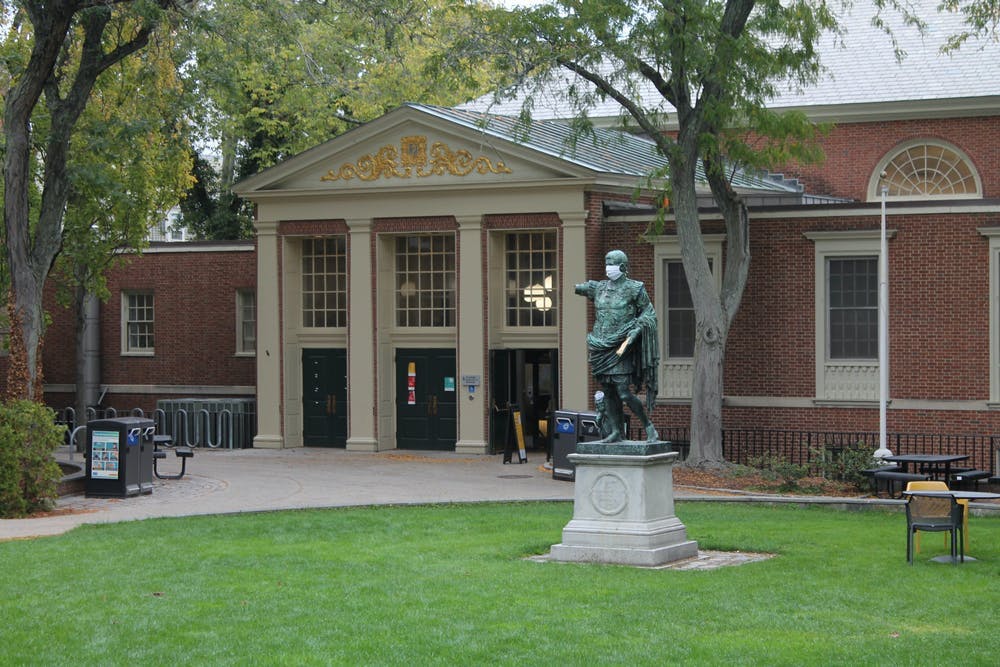The University plans to renovate the Verney-Woolley Dining Hall next summer and recently purchased $300,000 in new equipment for dining halls, Vice President of Dining Services George Barboza wrote in a Friday op-ed for The Herald.
Barboza’s op-ed also notes that 93% of Brown Dining Services’ bargaining unit positions — unionized positions within BDS — will soon be filled, and that the use of disposable plates and cutlery will end in dining halls “hopefully by next week.” It additionally announces that, in response to student feedback, the Blue Room will accept Flex Points again beginning on Monday.
In an interview with The Herald, Barboza said that many of the announcements were long-standing plans that the University chose to communicate now.
The op-ed came on the heels of an Oct. 3 article in The Herald detailing understaffing and broken equipment within the University’s dining halls, and a wave of student activism that included a sit-in outside Friedman Hall last night, where a few members of the Corporation — the University’s highest governing body — were participating in annual student discussions. Students later marched to Italian restaurant Bacaro, where the Corporation was scheduled to have an informal dinner.
In The Herald’s initial reporting, BDS workers said that staffing levels were lower than they had ever seen, and that old infrastructure was breaking down while new machinery sat uninstalled on loading docks.
Staffing levels, Barboza said in an interview with The Herald, have seen a meaningful rise since the beginning of the academic year. But initially, he said, BDS encountered challenges in filling applicant pools, despite having posted jobs “quite a few months ago.”
“Initially, the challenge was just getting qualified applicants to apply,” he said in the interview. BDS then engaged in “targeted work,” “networking” and discussing “best practices” with Ivy League peers about recruiting. Applicant pools began to grow at the end of August, he said.
“For the first two months, the pools were sitting empty,” he said. “We were very surprised to say the least.”
BDS’s embedded human resources team, Barboza said, planned to expedite the onboarding process to roughly two weeks as early as this spring. That process includes an interview, a physical and a background and reference check. In previous interviews with The Herald, workers said that BDS was taking two months to fill new positions.
“It’s not that it was taking two months to get hired,” Barboza said. “It’s that we didn’t have the candidates.”
“In no way do we diminish the impact of a 7% vacancy rate on current employees, but it’s important to clarify that we’re not operating at some small fraction of typical staffing levels,” the op-ed reads. The University, Barboza wrote in the op-ed, is working “aggressively” to fill positions at hiring fairs and through ads, as well as conducting one-on-one outreach and “recruiting more student workers.”
One union steward declined to speak on the record with The Herald about the contents of the op-ed, and another did not respond to a request for comment before publication time.
Barboza also said in the interview that investments in new equipment and renovations had been in the works for months and years, respectively.
BDS began planning new equipment purchases this spring, and began purchasing in late June and early July, Barboza said, with the intent of being prepared to open dining halls at full capacity in September. But supply chain problems delayed delivery into the fall semester, he said.
“The companies came back and said, ‘We have much longer lead times than we thought,’” Barboza said. As of now, BDS expects the final two pieces of undelivered equipment to arrive in the coming week, he added.
BDS, Barboza said, would not normally share the news of new equipment with the broader University community, but had already previously informed staff members. And while the V-Dub announcement came slightly earlier than planned, plans for renovations had been in the works for over a year, with a target of summer 2022. The first “principles meeting” regarding the renovations took place today, Barboza said.
According to the op-ed, renovations to the V-Dub will “enlarge and enhance the production area,” in addition to adding cooler and freezer space as well as increased seating capacity and “student-facing stations.” Limited fridge and freezer space in the V-Dub created challenging work conditions that also made it difficult to regulate food temperatures, workers said in the initial Herald article.
Regarding claims from workers that the Sharpe Refectory went without hot water for months at a time, Barboza said in the interview that he “knew there was a problem” and that BDS reached out to facilities immediately, but he did not provide a specific time frame for the duration of the problem.
Barboza’s op-ed also pushes back on “claims that the voices of dining staff are not being fully considered.” In The Herald’s reporting, a number of workers said that complaints did not make it beyond their managers’ offices to upper-level administrators.
“We care deeply about our staff,” Barboza said in the interview. “We consider them family. That we don’t care for our staff is absolutely not true.”
“We hold daily meetings between staff and shift supervisors, as well as regular meetings with the director of labor relations for dining and union leaders,” the op-ed reads. “And we pride ourselves on our open-door policy, through which any employee is encouraged to interact with dining’s senior team.”
“Brown is a leader in the local food service industry in regard to hourly wages, regular increases, employee benefits and opportunities for advancement,” the op-ed continues, noting that the University “(continues) to discuss” those topics during union negotiations, which began this fall. The union’s contract is set to expire Nov. 1.
“Both sides are at the table negotiating in good faith,” Barboza said in the interview. “Outside of that, I really can’t say anything more.”
The contents of the op-ed, he added, were what the University could say “right now without impacting what’s happening at the table.”
In response to claims that sanitation practices, especially in the V-Dub dish room, were not up to par, the op-ed says that “across everything we do, safety and hygiene are our top priorities.”
“We work with the Rhode Island Department of Health on both scheduled and unscheduled inspections, contract with a vendor who specializes in dining safety and are proud of our reputation for providing healthy and delicious food served safely,” the op-ed continues.
The shift to “single-use wares,” Barboza said in the interview, was aimed at “relieving pressure points.” Some dish room staff, he said, had been reallocated to “where we needed the help.”
The Ratty and V-Dub, he added, will likely shift back to “china and flatware” by next week.
BDS, Barboza said in the interview and the op-ed, will begin its “five-year strategic planning process” in the coming months.
That process, according to the op-ed, will “evaluate, plan and best position dining operations and facilities to align with needs across campus” and include student representation. In the interview, Barboza said that the process will likely begin in early to mid- November, playing out over the course of four to six months.

Will Kubzansky was the 133rd editor-in-chief and president of the Brown Daily Herald. Previously, he served as a University News editor overseeing the admission & financial aid and staff & student labor beats. In his free time, he plays the guitar and soccer — both poorly.





